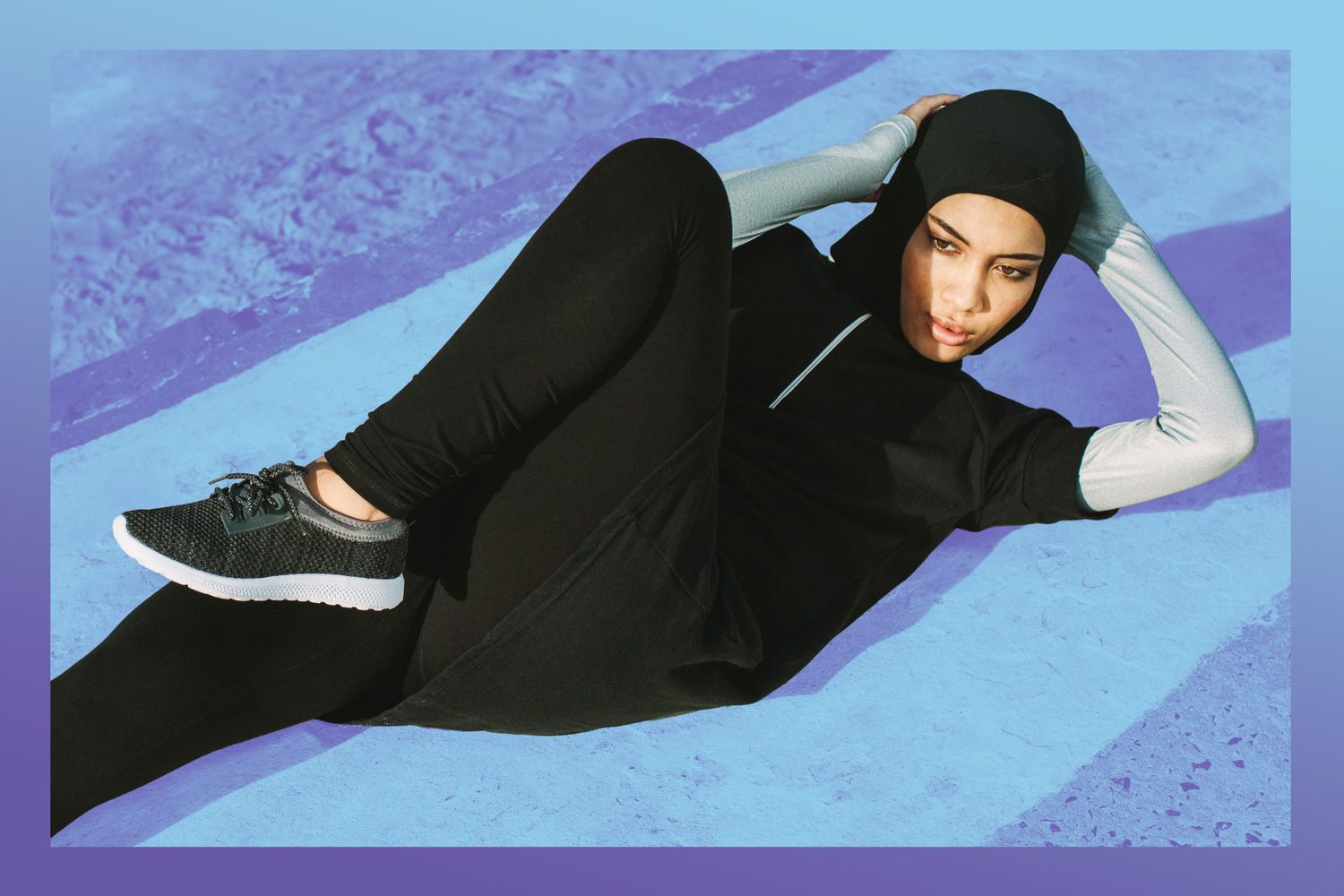Su Guía para Hacer Ejercicio mientras Ayuna

Ramadán es un mes sagrado islámico durante el cual los musulmanes de todo el mundo hacen ayuno todos los días desde el amanecer hasta el atardecer. Como puedes imaginar, el hambre y la sed durante este tiempo son reales. Cuando Ramadán, que se basa en el calendario lunar, cae durante el verano (piensa en horas de luz diurna más largas), aquellos que observan esta práctica no comerán ni beberán nada (incluso agua) hasta bien entrada la noche.
Las personas que eligen hacer ayuno durante el mes de Ramadán generalmente se despiertan antes del amanecer para consumir una comida previa al ayuno, conocida como suhur o sehri. La comida que se come después del atardecer se conoce como iftar. Mientras el sol está abajo, no hay límite para cuánto puedes comer o beber.
Para muchos musulmanes, encontrar una manera de navegar la vida diaria mientras ayunan significa mantener un régimen de ejercicio saludable. Pero ¿es seguro seguir haciendo ejercicio cuando no hay comida para alimentar tu cuerpo y no puedes ni siquiera beber agua para mantenerte hidratado durante el día? Aquí, dos expertos dan su opinión sobre la seguridad de hacer ejercicio mientras se ayuna y comparten las pautas que debes tener en cuenta si decides ser activo durante tu ayuno.
Hacer ejercicio mientras ayunas por Ramadán o por otra razón (digamos, ayuno intermitente) es seguro en la mayoría de los casos, según Aaliya Yaqub, M.D., una médica certificada por el consejo y una experta en bienestar que practica la medicina interna. De hecho, la investigación sugiere que podría haber un beneficio sorprendente al hacer ejercicio mientras ayunas. "El ayuno durante Ramadán puede estar asociado con un aumento en la hormona del crecimiento humano, la hormona producida en la glándula pituitaria en tu cerebro", dice la Dra. Yaqub. "[HGH] juega un papel en la reparación y el metabolismo celular y aumenta el crecimiento muscular y el rendimiento del ejercicio. También puede ayudarte a recuperarte de lesiones y enfermedades con más facilidad".
"¿Es posible ser físicamente activo, o incluso ser un atleta de élite, y ayunar? Sí", dice Dua Aldasouqi, M.A., R.D.N., dietista registrada y fundadora de un dietista musulmán. "¿Hay cosas de las que debes ser consciente y que debes considerar? Absolutamente".
Para algunas personas, puede ser necesario conversar con un médico antes de decidir hacer ejercicio mientras ayunan. Esto es especialmente cierto para aquellos con afecciones médicas crónicas, como la diabetes, así como aquellos que toman ciertos medicamentos, como diuréticos y medicamentos para la presión arterial, ya que pueden provocar desequilibrios electrolíticos o hacer que te deshidrates más rápido, explica la Dra. Yaqub.
"Si te sientes mal de alguna manera, es mejor consultar a tu médico antes de comenzar una rutina de ejercicios, especialmente si buscas hacer ejercicios de alta intensidad", agrega. Los ejercicios a una tasa cardíaca e intensidad más alta requieren carbohidratos para obtener energía rápida. Sin ellos (o con una pequeña cantidad de ellos), es más probable que te sientas cansado, débil y adolorido y te deshidrates. El resultado: esto puede dejarte mareado y potencialmente nauseabundo, lo que puede inhibir tu enfoque y capacidad para ejecutar ejercicios, aumentando así tu riesgo de lesiones (ver más: ¿Deberías Hacer Cardio en Ayunas?)
Además de determinar si hacer ejercicio mientras ayunas es una opción para ti, tu médico también puede ayudarte a desarrollar una estrategia para mantenerse hidratado y hacer ejercicio de manera segura con el estómago vacío durante Ramadán. (Es importante tener en cuenta que hacer ejercicio mientras ayuna no debe usarse como método de pérdida de peso).
Cualquiera que ayune querrá tomar precauciones para evitar la deshidratación, pero esto es particularmente cierto para aquellos que tienden hacia entrenamientos desafiantes (por ejemplo, HIIT).
"Dado que hay una ventana más corta para consumir líquidos [durante Ramadán], es realmente importante que las personas ingieran la mayor cantidad posible de hidratación después de romper el ayuno y por la mañana mientras se preparan su primera comida del día", dice la Dra. Yaqub. "La recomendación estándar son ocho vasos de agua al día. Si puedes tomar seis u ocho vasos o el equivalente a eso, estás en muy buena forma".
Pero la vida sucede y algunos días simplemente puede que no puedas tomar suficiente H2O antes del amanecer, tal vez ya llegas tarde al trabajo o tal vez te quedaste en la oficina hasta tarde en la noche. Si no puedes hidratarte adecuadamente, omite el ejercicio intenso y en su lugar da un paseo para obtener tu dosis diaria de movimiento, recomienda la Dra. Yaqub.
Además de mantener una ingesta adecuada de líquidos, también debes priorizar el consumo de electrolitos si te interesa hacer ejercicio mientras ayunas, señala la Dra. Yaqub. ICYDK, los electrolitos son minerales esenciales, como el sodio, potasio y calcio, que son vitales para muchas funciones corporales, incluyendo el mantenimiento del equilibrio entre los líquidos dentro y fuera de tus células, según la Clínica Cleveland. En otras palabras, los electrolitos se aseguran de que suficiente H2O se quede dentro y limitan cuánto de ella sale de tu cuerpo, lo que de otra manera causaría deshidratación.
'Fruits that are very high in water [e.g. watermelon, cantaloupe, strawberries] are going to help make sure you get those electrolytes,' says Aldasouqi. Sipping on sports drinks, such as Gatorade, can also help on the electrolyte front, but these beverages are often loaded with additives and sugars. (Too much sugar, for example, can not only cause fluctuations in blood sugar, but can also lead to bloating, discomfort, and even cramping — all of which can negatively impact your ability to safely exercise on an empty stomach.)
'I usually recommend diluting [sports drinks],' notes Aldasouqi. 'You can also make your own [electrolyte-boosting drink] with 2 to 3 cups of water, half to a whole lemon juiced, and 1/8 teaspoon of salt.'
So how do you know if you're dealing with dehydration? 'One of the most common signs [of dehydration] is an increase in your heart rate,' says Dr. Yaqub. 'Sometimes people will start feeling weak, dizzy, or nauseated, have a difficult time focusing, and notice [that] their productivity goes down.' While any of these symptoms are enough to warrant a call to your doctor, if you experience significant pain or faint, you should especially reach out.
When it comes to working out while fasting for Ramadan, avoid picking up the intensity at the gym, suggests Dr. Yaqub. 'I know that's not always possible if [for example] you're an athlete, but for the average person, it's probably a good idea to stay away from high-intensity workouts while you're fasting.'
Instead, opt for moderate physical activity, 'which has been shown to be safe for the average healthy individual,' adds Aldasoqi. ''Moderate' is basically something that gets your heart pumping, but it's not at a level where you can't hold a conversation while you're being active.'
Other good options for exercising on an empty tum are lower-intensity activities, such as leisurely swimming, yoga (with the exception of hot yoga for obvious, dehydrating reasons), as well as Pilates, according to Dr. Yaqub. And if you're someone who doesn't exercise regularly (no judgment!), consider waiting until after the holiday or your fast to start incorporating more physical activity.
'The absolute safest, though probably the least practical, is to do it [during] the non-fasting hours, so in the night,' says Aldasouq.'For a lot of people, that's not very practical, especially when Ramadan is during the spring/summer [and the sun sets late in the day].'
Another option? Getting a workout in right before breaking the fast. 'Yes, you're the most depleted at that point, but it's also closest to when you are going to replete and replenish everything,' explains Aldasouq. (
If you're set on working out while fasting, eating the right foods — in addition to, of course, drinking plenty of fluids — before sunrise and after sundown can make all the difference.
'Focusing on high-protein foods is a really good idea so that you have energy that extends and lasts a little bit longer,' says Dr. Yaqub, who counts nuts, eggs, avocado, fish, and chicken as excellent food choices for those that are fasting. 'Make sure you're getting enough protein through the month of Ramadan — even though you're fasting, you still have the same protein requirements,' she adds. 'You're just trying to fit them in during a shorter window of time.'
You should also get your fill of fibrous foods, such as oatmeal, lentils, and fruits and veggies, among other high-fiber eats. 'Fiber slows down the digestion and absorption of food, so you get steady energy that lasts,' Sarah Romotsky, R.D., previously told Shape. But keeping you full and fueled for hours is just one of the nutrient's many perks. Soluble fiber, in particular, forms a gel-like substance in your gut, slowing down the absorption of carbohydrates and preventing blood sugar spikes. And the more stable your blood sugar, the less likely you are to experience those sugar highs and lows and that rollercoaster of energy that comes with it.
On the flip side, 'folks who are consuming high-carb meals during sehri/suhoor are probably at a disadvantage [throughout the day],' says Dr. Yaqub.
As for calorie intake, most people don't need to think too hard about this number, even if they're physically active — unless you are an elite athlete or have a history of disordered eating, according to Aldasouqi. (And if you fit either or both of those categories, it's a good idea to consult a nutritionist to develop the best diet for you and your goals, whether that's workingout while fasting during Ramadan or otherwise.)
That's fine, according to Aldasouqi, who adds that many people choose to prioritize spirituality over fitness during the month of Ramadan. If you'd like to take a break from the gym, ease back into your fitness routine after Ramadan comes close, says Dr. Yaqub.




